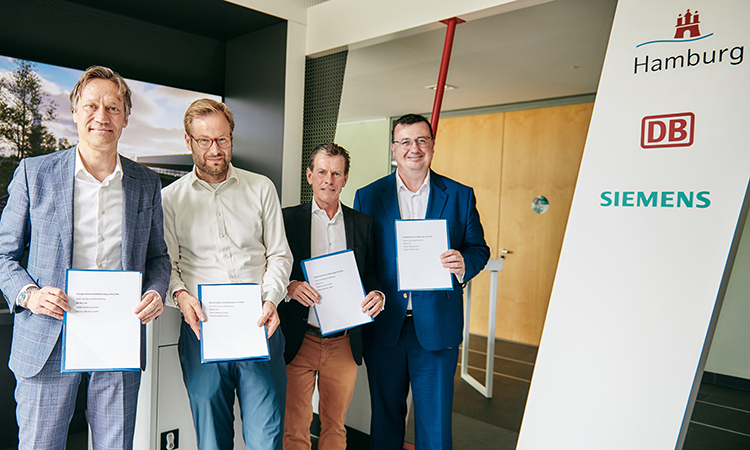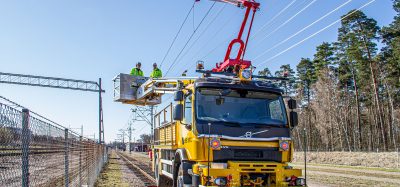City of Hamburg, DB and Siemens Mobility sign Cooperation agreement for Digitale S-Bahn
Posted: 18 July 2023 | Elliot Robinson (Editorial Assistant - Global Railway Review) | No comments yet
DB, Siemens Mobility and the City of Hamburg are jointly investing €35 million in a new intelligent operations control system.


Credit: Siemens Mobility
With the Digitale S-Bahn Hamburg, train travel will become even more environmentally friendly in the future. Deutsche Bahn (DB), the city of Hamburg, and Siemens Mobility are introducing a new intelligent operations control system for the Digitale S-Bahn in Hamburg, aiming to reduce the trains’ power consumption by up to 30%. The system will be tested until the UITP World Congress 2025. The project, costing €35 million, is jointly funded by DB, the city of Hamburg, and Siemens Mobility.
“With the Digital Rail, we will operate trains even more energy-efficiently in the future,” Dr. Kristian Weiland, DB Head of Development Digitale Schiene Deutschland, said. “In addition to providing additional capacity and higher reliability, the technology has the potential to reduce energy consumption by up to 30%, according to initial estimates. Considering the current energy demand of the S-Bahn Hamburg, we would save the energy consumption of 10,000 households per year in the Hanseatic city alone. Here at the S-Bahn Hamburg, we are developing the technology that will later be used nationwide.”
“The digitisation of mobility is a key factor in a successful mobility transition,” Dr. Anjes Tjarks, Hamburg’s Senator for Transport and Mobility Transition, said. “As the S-Bahn in Hamburg shows, innovative technologies and intelligent systems can contribute to creating sustainable and efficient solutions. The future of mobility lies in digital transformation, enabling us to develop environmentally friendly and resource-efficient solutions for sustainable transportation systems. The Digitale S-Bahn is already in daily use between Berliner Tor and Bergedorf, and by 2030, it is planned to automatically transport our passengers from A to B. The automation and digitisation of trains are also part of our joint agreement with the federal government to establish Hamburg as a model region for mobility nationwide.”
Related content you will enjoy:
Alpha Trains and Siemens Mobility sign service contract for Vectron locomotives
Siemens Mobility extend service contract for rail vehicles in the North of England
“Together with our partners, we have shown that, within a short period, automated rail transport is possible in an open railway system for the first time,” Michael Peter, Chief Executive Officer Siemens Mobility, said. “With Digitale S-Bahn Hamburg 2.0, we are now taking the next step, developing and testing globally innovative functions for the highest energy efficiency. This is an important step towards reducing CO2 and operating costs, and it is part of the most significant technological change on the railway, which we are driving forward together here in Hamburg.”
“The new project is another step towards the digitisation of the S-Bahn Hamburg,” Kay Arnecke, Managing Director S-Bahn Hamburg, said. “We have been very successful with the pilot route of the Digitale S-Bahn in passenger service since last September. Now we can create further prerequisites for an efficient and energy-saving digital S-Bahn operation of the future.”
The intelligent operations system of the Digitale S-Bahn Hamburg 2.0 saves energy through two approaches. With the technology knowing the exact positions of all trains in the network, rolling phases can be better utilised, and stops on the track can be avoided. Furthermore, the system reduces peak loads in power consumption by preventing multiple trains from starting simultaneously on the track. The project will also include a study to investigate the potential of energy recuperation through inverters into the public power grid.
The technology of the Digitale S-Bahn Hamburg is already in daily use for passengers. Four digitally controlled trains are currently operating on the Hamburg route between Berliner Tor and Bergedorf. 64 new S-Bahn trains equipped with digital technology have already been ordered. By the end of the decade, the city area of the S-Bahn Hamburg is planned to be equipped with the digital system. In 2021, the partners of the Digitale S-Bahn Hamburg jointly introduced the world’s first highly automated train in an open railway system.
Related organisations
Related regions
Related people
Dr. Anjes Tjarks, Dr. Kristian Weiland, Kay Arnecke, Michael Peter







